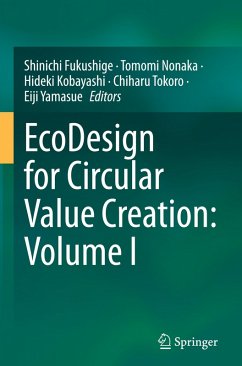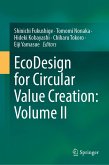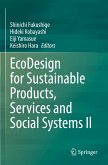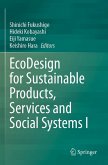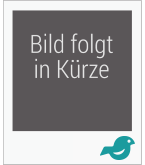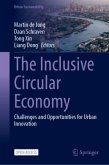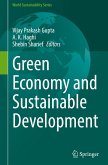EcoDesign for Circular Value Creation: Volume I
Herausgegeben:Fukushige, Shinichi; Nonaka, Tomomi; Kobayashi, Hideki; Tokoro, Chiharu; Yamasue, Eiji
EcoDesign for Circular Value Creation: Volume I
Herausgegeben:Fukushige, Shinichi; Nonaka, Tomomi; Kobayashi, Hideki; Tokoro, Chiharu; Yamasue, Eiji
- Gebundenes Buch
- Merkliste
- Auf die Merkliste
- Bewerten Bewerten
- Teilen
- Produkt teilen
- Produkterinnerung
- Produkterinnerung
This 2-volume book sheds new light on the forefront of ecodesign research, encompassing product and service design, smart manufacturing, and social perspectives. Featuring selected papers from EcoDesign 2023: 13th International Symposium on Environmentally Conscious Design and Inverse Manufacturing, it offers interdisciplinary approaches to foster sustainable innovations. Within the framework of the Sustainable Development Goals (SDGs), it underscores the necessity for the manufacturing sector to innovate for sustainable value creation, taking into account technological advancements,…mehr
Andere Kunden interessierten sich auch für
![EcoDesign for Circular Value Creation: Volume II EcoDesign for Circular Value Creation: Volume II]() EcoDesign for Circular Value Creation: Volume II122,99 €
EcoDesign for Circular Value Creation: Volume II122,99 €![EcoDesign for Sustainable Products, Services and Social Systems II EcoDesign for Sustainable Products, Services and Social Systems II]() EcoDesign for Sustainable Products, Services and Social Systems II98,99 €
EcoDesign for Sustainable Products, Services and Social Systems II98,99 €![EcoDesign for Sustainable Products, Services and Social Systems I EcoDesign for Sustainable Products, Services and Social Systems I]() EcoDesign for Sustainable Products, Services and Social Systems I106,99 €
EcoDesign for Sustainable Products, Services and Social Systems I106,99 €![Design for Sustainability Design for Sustainability]() Xin LiuDesign for Sustainability129,99 €
Xin LiuDesign for Sustainability129,99 €![The Inclusive Circular Economy The Inclusive Circular Economy]() The Inclusive Circular Economy38,99 €
The Inclusive Circular Economy38,99 €![Green Economy and Sustainable Development Green Economy and Sustainable Development]() Green Economy and Sustainable Development121,99 €
Green Economy and Sustainable Development121,99 €![Green Horizons: Advancing Climate Solutions through Green Finance, Circular Economy, and ESG Green Horizons: Advancing Climate Solutions through Green Finance, Circular Economy, and ESG]() Green Horizons: Advancing Climate Solutions through Green Finance, Circular Economy, and ESG151,99 €
Green Horizons: Advancing Climate Solutions through Green Finance, Circular Economy, and ESG151,99 €-
-
-
This 2-volume book sheds new light on the forefront of ecodesign research, encompassing product and service design, smart manufacturing, and social perspectives. Featuring selected papers from EcoDesign 2023: 13th International Symposium on Environmentally Conscious Design and Inverse Manufacturing, it offers interdisciplinary approaches to foster sustainable innovations. Within the framework of the Sustainable Development Goals (SDGs), it underscores the necessity for the manufacturing sector to innovate for sustainable value creation, taking into account technological advancements, regulatory requirements, and consumer behavior. Additionally, it explores the concept of the circular economy, which originated in Europe and seeks to enhance resource efficiency by transitioning from a linear to a circular economic model. This book aims to unite professionals across the globe who are dedicated to advancing the field of ecodesign, and facilitating the exchange of knowledge acrossvarious disciplines and communities.
The first volume highlights the product life cycle design and management, sustainability assessment for ecoDesign, and circular economy. Readers will delve into the environmentally conscious design of products and services, life cycle management, sustainable manufacturing, EoL management and process technologies, green supply chain management, life cycle evaluation, and sustainability indices. Contributions from renowned scholars provide critical insights into ecodesign regulations compliance processes like EPD certifications; consumer behavior towards eco-labels; innovative business models for sustainability; participatory approaches for ESG initiatives; digital twins for real-time life cycle assessment; AI techniques supporting wastewater treatment; among others.
The first volume highlights the product life cycle design and management, sustainability assessment for ecoDesign, and circular economy. Readers will delve into the environmentally conscious design of products and services, life cycle management, sustainable manufacturing, EoL management and process technologies, green supply chain management, life cycle evaluation, and sustainability indices. Contributions from renowned scholars provide critical insights into ecodesign regulations compliance processes like EPD certifications; consumer behavior towards eco-labels; innovative business models for sustainability; participatory approaches for ESG initiatives; digital twins for real-time life cycle assessment; AI techniques supporting wastewater treatment; among others.
Produktdetails
- Produktdetails
- Verlag: Springer / Springer Nature Singapore / Springer, Berlin
- Artikelnr. des Verlages: 978-981-97-9067-8
- Seitenzahl: 624
- Erscheinungstermin: 12. April 2025
- Englisch
- Abmessung: 241mm x 160mm x 37mm
- Gewicht: 1148g
- ISBN-13: 9789819790678
- ISBN-10: 9819790670
- Artikelnr.: 71826467
- Herstellerkennzeichnung
- Springer-Verlag KG
- Sachsenplatz 4-6
- 1201 Wien, AT
- ProductSafety@springernature.com
- Verlag: Springer / Springer Nature Singapore / Springer, Berlin
- Artikelnr. des Verlages: 978-981-97-9067-8
- Seitenzahl: 624
- Erscheinungstermin: 12. April 2025
- Englisch
- Abmessung: 241mm x 160mm x 37mm
- Gewicht: 1148g
- ISBN-13: 9789819790678
- ISBN-10: 9819790670
- Artikelnr.: 71826467
- Herstellerkennzeichnung
- Springer-Verlag KG
- Sachsenplatz 4-6
- 1201 Wien, AT
- ProductSafety@springernature.com
Dr. Fukushige is a professor at the Department of Industrial and Management Systems Engineering, School of Creative Science and Engineering, Waseda University. After obtaining his doctor's degree in precision machinery engineering from the University of Tokyo in 2006, he began work at Osaka University as an assistant professor. Since 2014, he served as an associate professor at the Department of Mechanical Engineering, Graduate School of Engineering, Osaka University before moving to Waseda University in 2020. His current research interests include product life cycle design and management, simulation of circular economy, environmentally conscious product and service design, and circular business design. Tomomi Nonaka specializes in production systems engineering and service engineering. She obtained a Ph.D in Systems Engineering at Keio University, Japan. She graduated from the Faculty of Environment and Information Studies at Keio University, and entered the Graduate School of System Design and Management at Keio University as a first-year student, completing the master's and doctoral programs. After serving as a specially appointed assistant professor at the Graduate School of Systems Informatics, Kobe University, an assistant professor at the Department of Management Systems Engineering, College of Science and Engineering, Aoyama Gakuin University, and an associate professor at the College of Gastronomy Management, Ritsumeikan University, she became a professor at the Department of Industrial and Management Systems Engineering, School of Creative Science and Engineering, Waseda University. In recent years, she has been engaged in research on sustainable business and social system design. Professor, Department of Mechanical Engineering, Graduate School of Engineering, Osaka University. Dean, Department of Mechanical Engineering, 2024. He holds a B.S. in Nuclear Engineering from Hokkaido University and a Ph.D. in Design Engineering from the Graduate School of Engineering, The University of Tokyo. He was engaged as a senior manager in the field of environmental and sustainable technologies at Toshiba Research and Development Center before assuming his current position. Chairman of the Carbon Neutrality Research Association. Co-director of the Italian Design Summer School (IDSS) at the University of Bologna. His main research interests are sustainable systems design and management, sustainable consumption and production, sustainable manufacturing, and sustainable transportation systems. Chiharu Tokoro is engaged in research on "Elucidation of mechanism and control of separation for toxic elements at the solid-liquid interface", "Development of novel separation materials and processes for useful elements", "Development of smart solid / solid separation technology and process for resources circulation", "Optimization of resources recycling process based on life cycle thinking" as well. Graduated from the University of Tokyo in 2003 (Doctoral degree of Engineering). Worked for Waseda University as an Assistant from 2004, Lecturer from 2007 and Associate Professor from 2009. Now, Professor of Faculty of Science and Engineering from 2015. Director of Office for Promotion of Equality and Diversity from 2018 to 2022. Project Professor of Institute of Industrial Science, the University of Tokyo from 2016. Professor of Faculty of Engineering at the University of Tokyo from 2021. Council member of Science Council of Japan, Ministry of Economy, Trade and Industry, and Ministry of Environment. Eiji Yamasue is a Professor at the Department of Mechanical Engineering in the College of Science and Engineering, Ritsumeikan University, Japan. He completed his PhD from Tokyo Institute of Technology in 2000. His research interests include industrial ecology, energy and resources, etc. He has authored several books and has published 120 papers with over 1800 citations to his credit.
Chapter 1. Proposal and performance evaluation of a fuel consumption system for H-bikes, considering the shared-cycle-use phase.- Chapter 2. A discussion of the thermal management system for metal hydride cartridges for H-bike.- Chapter 3. Replacement of manipulator modules based on workload using part agents.- Chapter 4. Development of a knowledge repository model for conflict management in life cycle design collaborations.- Chapter 5. Development of Internal Audit Process to Obtain EPD Certifications in response to ecodesign regulations.- Chapter 6. Verification of Operational Effect of Solar-powered System for Mobile Off-grid Architecture.- Chapter 7. Urban Conscious Product Design integrating a Life Cycle Perspective.- Chapter 8. Designing Labels with a Lasting Impact: How Eco-labels influence Purchase Behavior and Lifetime Extension of Clothing.- Chapter 9. An Analysis of a Circular Economy Strategy Combining Green Packaging Reuse Design and Sustainable Jewelry Development.- Chapter 10. Exploring Suitable Growing Parameters of Mycelium Prototyping for Art Installations..- Chapter 11. The role of shame and guilt in designing anti-littering interventions.- Chapter 12. Enhancing Sustainable Behavior in Waste Management: A Social Perspective.- Chapter 13. Factors influencing smart technologies social acceptance: A mini review study.- Chapter 14. Plastic packaging policy in Malaysia: An analysis towards the implementation of Extended Producer Responsibility (EPR).- Chapter 15. Second life of electric vehicle lithium-ion batteries from a sustainable business model perspective.- Chapter 16. European Union policy developments related to ecodesign, green claims and eco-labeling: implications for voluntary circular labeling initiatives.- Chapter 17. Factors affecting local Digital Transformation toward the sustainable local development.- Chapter 18. Analysis of the Effects of Adopting "Imaginary Future Generations" on the Design of Technology Development and Business Proposal - Case Study of Workshop at a Plating Processing Company.- Chapter 19. EXPLORING PARTICIPATORY APPROACHES FOR FACILITATING ESG INITIATIVES IN ORGANIZATIONS.- Chapter 20. Impact Assessment of Low-Carbon Electricity Transition by Applying Input-Output Analysis: A Case Study of the Impacts on Natural Gas Power Plants in Taiwan.- Chapter 21. Circular Strategies in Southeast Asia: Cambodian Customer Perception of Remanufactured Motorcycle Parts.- Chapter 22. Information Needs for Establishing Circularity-Focused Collaborations Among Product Manufacturers and Recyclers.- Chapter 23. Thermal-Based Allocation Method for Multiple Co-Product Resource Consumption in Plastic Recycling: A Case Study in Malaysia.- Chapter 24. Material flow analysis for the biomass waste management of palm oil mills with regard to sustainable palm oil production.- Chapter 25. Readiness Status of Smart Waste Collection and Processing Technologies for Plastic Waste Recycling.- Chapter 26. Research Framework for Urban Industrial Symbiosis.- Chapter 27. Methodology to model the environmental impact of the overall maintenance of aircraft engines.- Chapter 28. Digital Twins for real-time Life Cycle Assessment of Products.- Chapter 29. Towards a Framework for Sustainable Cross-Border Electronic Commerce.- Chapter 30. How Should AI Technique Support Wastewater Treatment and Sludge Management? A Case Study from Mongolia.- Chapter 31. Development of an Ideal Training Dataset for Visual Analysis-based Waste Sorting Robot: An Experiment with Mixed-construction Waste.- Chapter 32. Exploring the current applications and potential of extended reality for environmental sustainability in manufacturing.- Chapter 33. Exploring Factory Data for Resource Efficiency Assessment - A Case Study at Truck Manufacturing Company.- Chapter 34. An analysis method considering manufacturing skills and technologies toward slow-manufacturing.- Chapter 35. Reconfigurable Tooling for Circular Manufacturing: A Review.- Chapter 36. Sustainable Disjoining of Aluminium Multi-Material joints.- Chapter 37. Applying principles of biological transformation for product development and manufacturing.
Chapter 1. Proposal and performance evaluation of a fuel consumption system for H-bikes, considering the shared-cycle-use phase.- Chapter 2. A discussion of the thermal management system for metal hydride cartridges for H-bike.- Chapter 3. Replacement of manipulator modules based on workload using part agents.- Chapter 4. Development of a knowledge repository model for conflict management in life cycle design collaborations.- Chapter 5. Development of Internal Audit Process to Obtain EPD Certifications in response to ecodesign regulations.- Chapter 6. Verification of Operational Effect of Solar-powered System for Mobile Off-grid Architecture.- Chapter 7. Urban Conscious Product Design integrating a Life Cycle Perspective.- Chapter 8. Designing Labels with a Lasting Impact: How Eco-labels influence Purchase Behavior and Lifetime Extension of Clothing.- Chapter 9. An Analysis of a Circular Economy Strategy Combining Green Packaging Reuse Design and Sustainable Jewelry Development.- Chapter 10. Exploring Suitable Growing Parameters of Mycelium Prototyping for Art Installations..- Chapter 11. The role of shame and guilt in designing anti-littering interventions.- Chapter 12. Enhancing Sustainable Behavior in Waste Management: A Social Perspective.- Chapter 13. Factors influencing smart technologies social acceptance: A mini review study.- Chapter 14. Plastic packaging policy in Malaysia: An analysis towards the implementation of Extended Producer Responsibility (EPR).- Chapter 15. Second life of electric vehicle lithium-ion batteries from a sustainable business model perspective.- Chapter 16. European Union policy developments related to ecodesign, green claims and eco-labeling: implications for voluntary circular labeling initiatives.- Chapter 17. Factors affecting local Digital Transformation toward the sustainable local development.- Chapter 18. Analysis of the Effects of Adopting "Imaginary Future Generations" on the Design of Technology Development and Business Proposal - Case Study of Workshop at a Plating Processing Company.- Chapter 19. EXPLORING PARTICIPATORY APPROACHES FOR FACILITATING ESG INITIATIVES IN ORGANIZATIONS.- Chapter 20. Impact Assessment of Low-Carbon Electricity Transition by Applying Input-Output Analysis: A Case Study of the Impacts on Natural Gas Power Plants in Taiwan.- Chapter 21. Circular Strategies in Southeast Asia: Cambodian Customer Perception of Remanufactured Motorcycle Parts.- Chapter 22. Information Needs for Establishing Circularity-Focused Collaborations Among Product Manufacturers and Recyclers.- Chapter 23. Thermal-Based Allocation Method for Multiple Co-Product Resource Consumption in Plastic Recycling: A Case Study in Malaysia.- Chapter 24. Material flow analysis for the biomass waste management of palm oil mills with regard to sustainable palm oil production.- Chapter 25. Readiness Status of Smart Waste Collection and Processing Technologies for Plastic Waste Recycling.- Chapter 26. Research Framework for Urban Industrial Symbiosis.- Chapter 27. Methodology to model the environmental impact of the overall maintenance of aircraft engines.- Chapter 28. Digital Twins for real-time Life Cycle Assessment of Products.- Chapter 29. Towards a Framework for Sustainable Cross-Border Electronic Commerce.- Chapter 30. How Should AI Technique Support Wastewater Treatment and Sludge Management? A Case Study from Mongolia.- Chapter 31. Development of an Ideal Training Dataset for Visual Analysis-based Waste Sorting Robot: An Experiment with Mixed-construction Waste.- Chapter 32. Exploring the current applications and potential of extended reality for environmental sustainability in manufacturing.- Chapter 33. Exploring Factory Data for Resource Efficiency Assessment - A Case Study at Truck Manufacturing Company.- Chapter 34. An analysis method considering manufacturing skills and technologies toward slow-manufacturing.- Chapter 35. Reconfigurable Tooling for Circular Manufacturing: A Review.- Chapter 36. Sustainable Disjoining of Aluminium Multi-Material joints.- Chapter 37. Applying principles of biological transformation for product development and manufacturing.

